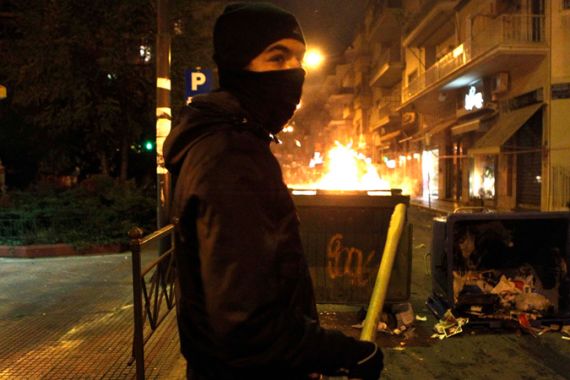Protesters clash with police in Athens
Demonstrations marking 1973 uprising against military rule marred by violence during anti-austerity protests.

Anti-austerity protesters have clashed with police in Athens during a march to mark the anniversary of the 1973 uprising that helped bring down Greece’s military rulers.
Masked youths on Thursday threw firebombs at police outside of parliament during an annual protest march to the
US Embassy.
|
“The challenge for the Greek government is to give people hope, not necessarily the kinds of people who are out there demonstrating today, but – if you like – the silent majority. – Barnaby Phillips, Al Jazeera |
Police fired tear gas and stun grenades to disperse the rioters, and some 60 people were detained for questioning but no injuries were reported.
According to police estimates, 28,000 people took part in the march, making it one of the biggest November 17 demonstrations in years.
Al Jazeera’s Barnaby Phillips, reporting from Athens, described the scene as “something of a lockdown atmosphere” with police out in large numbers.
Authorities said that 7,000 officers have been deployed to the protest, including about 700 riot police equipped with tear gas, shields and batons.
The November 17 demonstration traditionally draws huge crowds in the Greek capital every year.
People march from the polytechnic to the US embassy in protest at US support of the six-year junta, which the US saw at the time as a buffer against communism.
Large protests have also been reported in Crete, Patras and Thessalonika.
The march, which includes protesters who are against planned austerity measures which Greece must implement to tackle its growing debt crisis, is the first test of public sentiment for the new coalition government of Lucas Papademos.
Papademos’ challenge
Thursday’s demonstrations came a day after Papademos’ government overwhelmingly won a vote of confidence in parliament with 255 votes to 38.
The technocratic government must now approve a new bailout package and commit to reforms in order to secure the next instalment of an international loan.
Papademos, an unelected former banker, took over on Friday following days of political and market turmoil over Greece’s huge debts, which sparked fears it may have to leave the eurozone.
He said his priority was ratifying the international bailout package of $177bn agreed at an EU summit in October.
Addressing parliament shortly before the confidence vote, Papademos warned against raising expectations of what his government can achieve, with its coalition members angling for elections within a few months.
But he expressed optimism that the eurozone could overcome its current problems, saying: “It is up to us to apply the necessary policies so that when the eurozone recovers from the crisis, Greece will still be in the euro.”
Our correspondent in Athens said, “The challenge for the Greek government is to give people hope, not necessarily the kinds of people who are out there demonstrating today, but – if you like – the silent majority.
“He somehow, Lucas Papademos, must convince ordinary Greeks that there is light at the end of a very dark economic tunnel.”